中考英语短语词义辨析专项讲解
初三英语专题讲解词汇的辨析
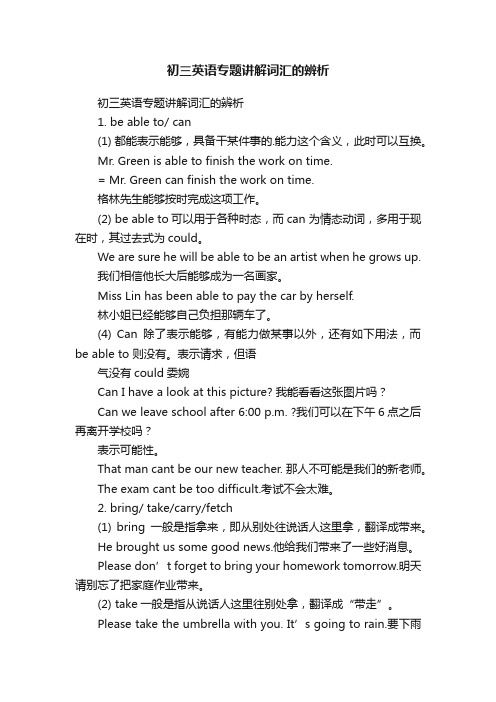
初三英语专题讲解词汇的辨析初三英语专题讲解词汇的辨析1. be able to/ can(1) 都能表示能够,具备干某件事的.能力这个含义,此时可以互换。
Mr. Green is able to finish the work on time.= Mr. Green can finish the work on time.格林先生能够按时完成这项工作。
(2) be able to可以用于各种时态,而can 为情态动词,多用于现在时,其过去式为could。
We are sure he will be able to be an artist when he grows up.我们相信他长大后能够成为一名画家。
Miss Lin has been able to pay the car by herself.林小姐已经能够自己负担那辆车了。
(4) Can除了表示能够,有能力做某事以外,还有如下用法,而be able to 则没有。
表示请求,但语气没有could委婉Can I have a look at this picture? 我能看看这张图片吗?Can we leave school after 6:00 p.m. ?我们可以在下午6点之后再离开学校吗?表示可能性。
That man cant be our new teacher. 那人不可能是我们的新老师。
The exam cant be too difficult.考试不会太难。
2. bring/ take/carry/fetch(1) bring一般是指拿来,即从别处往说话人这里拿,翻译成带来。
He brought us some good news.他给我们带来了一些好消息。
Please don’t forget to bring your homework tomorrow.明天请别忘了把家庭作业带来。
(2) take一般是指从说话人这里往别处拿,翻译成“带走”。
中考词汇总结高频词汇与词义辨析
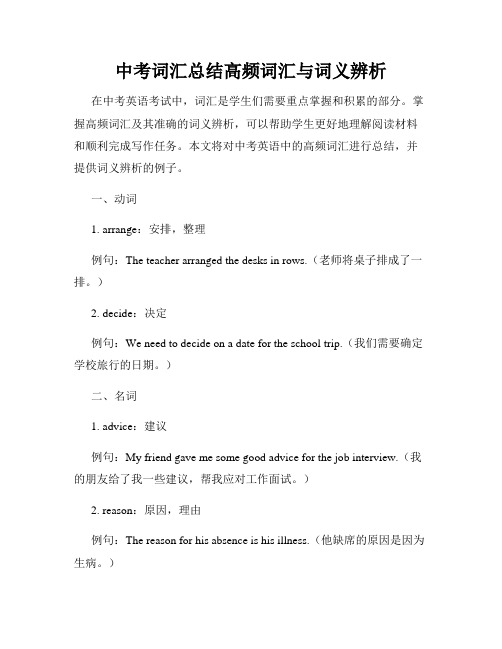
中考词汇总结高频词汇与词义辨析在中考英语考试中,词汇是学生们需要重点掌握和积累的部分。
掌握高频词汇及其准确的词义辨析,可以帮助学生更好地理解阅读材料和顺利完成写作任务。
本文将对中考英语中的高频词汇进行总结,并提供词义辨析的例子。
一、动词1. arrange:安排,整理例句:The teacher arranged the desks in rows.(老师将桌子排成了一排。
)2. decide:决定例句:We need to decide on a date for the school trip.(我们需要确定学校旅行的日期。
)二、名词1. advice:建议例句:My friend gave me some good advice for the job interview.(我的朋友给了我一些建议,帮我应对工作面试。
)2. reason:原因,理由例句:The reason for his absence is his illness.(他缺席的原因是因为生病。
)三、形容词1. polite:有礼貌的例句:Emily is always polite to her elders.(艾米莉对长辈总是非常有礼貌。
)2. honest:诚实的例句:He is an honest person and never tells lies.(他是一个诚实的人,从不说谎。
)四、副词1. quickly:快速地例句:She finished the race quickly and won the first place.(她迅速完成了比赛并获得了第一名。
)2. quietly:安静地例句:Please read quietly in the library.(请在图书馆安静地阅读。
)词义辨析:1. forget与remember虽然forget和remember都有“记住”的意思,但用法上有所不同。
forget表示“忘记”,后接名词或动名词,而remember表示“记得”,后接名词、动名词、动词-ing形式或从句。
2024中考备考英语重难点06 易混动词短语辨析(解析版)
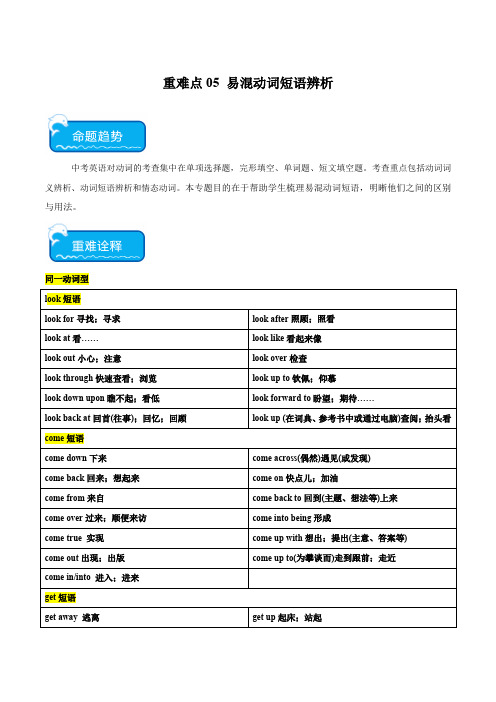
重难点05 易混动词短语辨析中考英语对动词的考查集中在单项选择题,完形填空、单词题、短文填空题。
考查重点包括动词词义辨析、动词短语辨析和情态动词。
本专题目的在于帮助学生梳理易混动词短语,明晰他们之间的区别与用法。
同一动词型同一介词/副词型(2023中考真题建议用时:15分钟)(2023·辽宁鞍山·中考真题)—Could you please tell me where Mr Green is?—Sure. He has ________ for London.A.cut out B.put out C.come out D.set out 2.(2023·辽宁朝阳·中考真题)—I don’t know how to ________ the old books.—Why don’t you give them away to the kids in poor areas?A.deal with B.put on C.hand out D.take up 3.(2023·内蒙古·中考真题)—Michael, ________ this shirt.—Oh, it looks nice on me.A.throw away B.put down C.take off D.try on4.(2023·西藏·中考真题)—Remember to ________ your glasses before doing eye exercises.—Sure, I will.A.take off B.take up C.put off D.put up 5.(2023·四川甘孜·中考真题)We should ________ who broke the door of the classroom yesterday.A.come out B.go out C.find out D.put out 6.(2023·湖北襄阳·中考真题)—Shall we go to the nature park this weekend?—Good idea. We can ________ fresh air in the park.A.take up B.take down C.take in D.take off7.(2023·湖北黄石·中考真题)—Everyone should build the good habit of saving food.—I agree, so I always ________ the food I order.A.eat up B.use up C.throw away D.give away8.(2023·内蒙古呼和浩特·中考真题)When you go to a new school this September, you’d better learn how to ________ your classmates.A.catch up with B.get along with C.take care of D.get out of9.(2023·江苏常州·中考真题)—Can you ________ the sign for the community party?—Sure, where should I hang it?A.keep up B.take up C.give up D.put up10.(2023·辽宁阜新·中考真题)Tina ________ her sunglasses on the beach because the sunlight was so strong.A.put up B.put on C.put away D.put down11.(2023·江苏南通·中考真题)The wind energy costs very little and will never ________. Besides, it produces little pollution.A.blow out B.run out C.put out D.break out12.(2023·黑龙江哈尔滨·中考真题)The football game has to be ________ till next Friday because of the bad weather.A.put off B.put on C.put up13.(2023·山东青岛·中考真题)—Are you ready for the show?—No. It’s easy to ________ a play but difficult to act it out.A.make up B.take up C.look up D.put up14.(2023·湖北十堰·中考真题)My friend promised to come to my birthday party. However, he didn’t ________ in the end.A.give up B.cut up C.show up D.pick up15.(2023·江苏徐州·中考真题)I loved the book so much that I could hardly ________.A.put it up B.put it down C.put it on D.put it out16.(2023·辽宁抚顺·中考真题)Ann is ________ her notes for her English exam now.A.paying for B.giving away C.looking through D.putting up17.(2023·吉林长春·中考真题)My friend can always _______ good ideas to solve his problems.A.keep away from B.take care of C.get on with D.come up with18.(2023·江苏泰州·中考真题)Most neighbours ________ the habit of square dancing to create a quieter environment for us.A.get into B.care about C.carry on D.give up19.(2023·四川遂宁·中考真题)—It’s said that ChatGPT has both good and bad sides.—Well, it all ________ how you use itA.leads to B.sounds likeC.turns into D.depends on20.(2023·辽宁·中考真题)While staying in Beijing, the foreigners like to ________ in Beijing hutongs.A.hang out B.bring out C.try out D.set out21.(2023·辽宁营口·中考真题)The smell of the sea ________ memories of his childhood.A.called at B.called off C.called up D.called on22.(2023·四川乐山·中考真题)— What do the letters “CPC” mean in the article?— Don’t you know that, Amy? They ________ “Communist Party of China”.A.search for B.look for C.stand for23.(2023·湖北孝感·中考真题)—Look at the sign. What does it mean?—It means we should ________ the rubbish ________ the proper rubbish bins.A.put; into B.throw; around C.mix; into D.try; on24.(2023·福建·中考真题)I ________ the great scientist from magazines, and I wish to see him some day.A.know about B.look after C.talk with25.(2023·湖北荆州·中考真题)—Jimmy, the bikes you gave away to the poor kids help them a lot. What gave you the idea?—I guess I _______ my father. He always volunteers to help people.A.take after B.look after C.talk back D.turn down1.D【详解】句意:——你能告诉我格林先生在哪儿吗?——当然。
九年级英语词汇辨析专题讲解
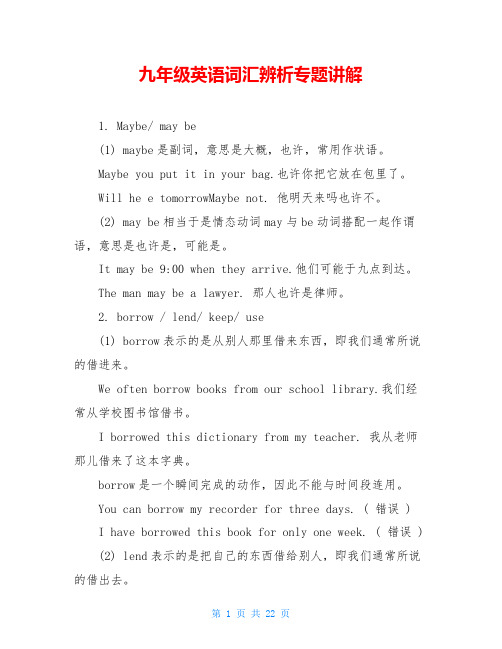
九年级英语词汇辨析专题讲解1. Maybe/ may be(1) maybe是副词,意思是大概,也许,常用作状语。
Maybe you put it in your bag.也许你把它放在包里了。
Will he e tomorrowMaybe not. 他明天来吗也许不。
(2) may be相当于是情态动词may与be动词搭配一起作谓语,意思是也许是,可能是。
It may be 9:00 when they arrive.他们可能于九点到达。
The man may be a lawyer. 那人也许是律师。
2. borrow / lend/ keep/ use(1) borrow表示的是从别人那里借来东西,即我们通常所说的借进来。
We often borrow books from our school library.我们经常从学校图书馆借书。
I borrowed this dictionary from my teacher. 我从老师那儿借来了这本字典。
borrow是一个瞬间完成的动作,因此不能与时间段连用。
You can borrow my recorder for three days. ( 错误 )I have borrowed this book for only one week. ( 错误 )(2) lend表示的是把自己的东西借给别人,即我们通常所说的借出去。
Thank you for lending me your bike.谢谢你把自行车借给我。
He often lends money to his brother.他经常借钱给他弟弟。
lend与borrow一样,也是一个瞬间完成的动作,不能与一段时间连用。
(3) keep的意思也是借,但一般是指借来后的保存或使用阶段,是一段持续的时间,因此可以与时间段连用。
You can keep my recorder for three days.我的录音机你可以借用三天。
中考重点常见词汇和短语的辨析
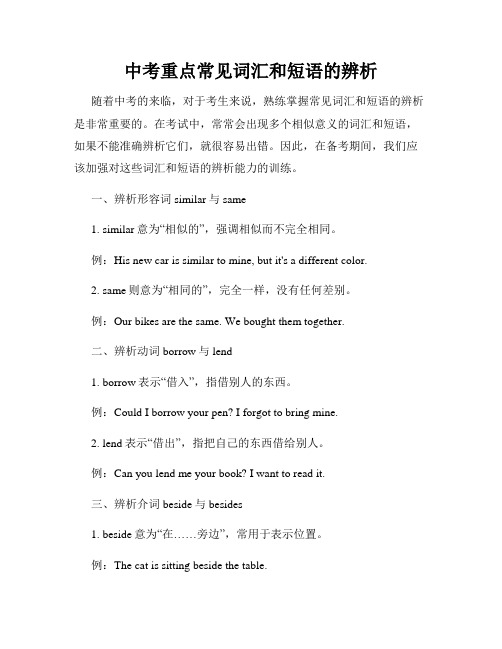
中考重点常见词汇和短语的辨析随着中考的来临,对于考生来说,熟练掌握常见词汇和短语的辨析是非常重要的。
在考试中,常常会出现多个相似意义的词汇和短语,如果不能准确辨析它们,就很容易出错。
因此,在备考期间,我们应该加强对这些词汇和短语的辨析能力的训练。
一、辨析形容词similar与same1. similar意为“相似的”,强调相似而不完全相同。
例:His new car is similar to mine, but it's a different color.2. same则意为“相同的”,完全一样,没有任何差别。
例:Our bikes are the same. We bought them together.二、辨析动词borrow与lend1. borrow表示“借入”,指借别人的东西。
例:Could I borrow your pen? I forgot to bring mine.2. lend表示“借出”,指把自己的东西借给别人。
例:Can you lend me your book? I want to read it.三、辨析介词beside与besides1. beside意为“在……旁边”,常用于表示位置。
例:The cat is sitting beside the table.2. besides意为“除了……之外”,常用于表示除了某事物或某人之外还有其他的事物或人。
例:Besides apples, we also have oranges.四、辨析动词learn与teach1. learn表示“学习”,指通过努力和训练获取新的知识或技能。
例:I learn English every day.2. teach表示“教”,指教授知识或技能给他人。
例:She teaches us math every Monday.五、辨析连词unless与if1. unless意为“除非”,相当于if not。
九年级英语重点词汇短语词义辨析
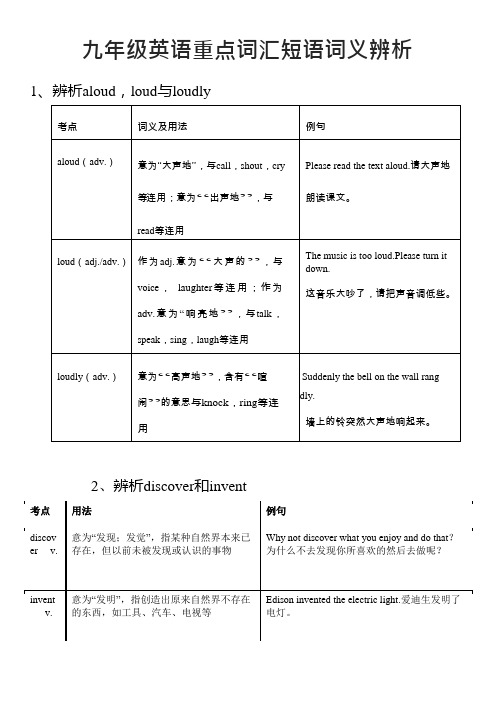
dress
既可表示动作也可表示状态,其后常跟人作宾语
Annie is dressing her sister.安妮在给她妹妹穿衣服。
6、辨析die,dead,dying与death
考点
用法
例句
die
v.死,死亡,指因为生病、年老、负伤等原因而死,是非延续性动词,不能同表示一段时间的状语连用
九年级英语重点词汇短语词义辨析
1、辨析aloud,loud与loudly
考点
词义及用法
例句
aloud(adv.)
意为‘‘大声地’’,与call,shout,cry等连用;意为“出声地”,与read等连用
Please read the text aloud.请大声地朗读课文。
loud(adj./adv.)
He died two years ago.他是两年前去世的。
dead
adj.死的,无生命的,表示状态,可以与表示一段时间的状语连用。如果表达“死了多长时间”,用“have/has been dead for+时间段”或“died+时间段+ago”表示
His grandfather has been dead for ten years.=His grandfather died ten years ago.他的祖父已经去世十年了。
He put on his hat and went out.他戴上帽子出门了。
wear
意为“穿着;戴着”。强调穿/戴的状态
The lady was wearing a dress and sunglasses.那个女士穿着礼服戴着太阳眼镜。
(英语)中考英语短语动词易错剖析含解析
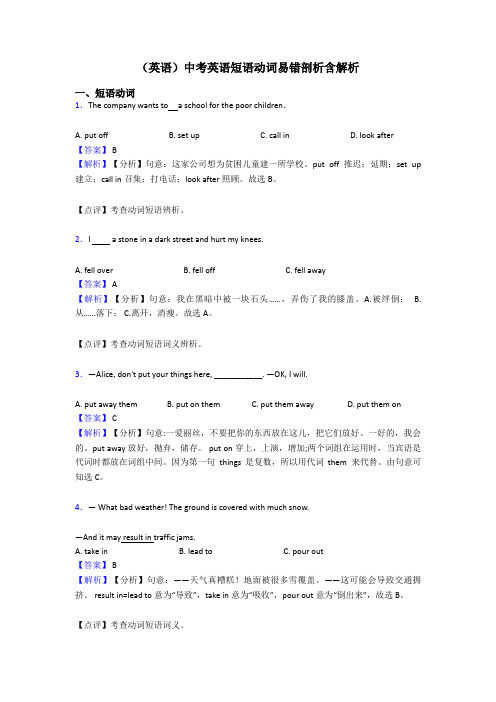
(英语)中考英语短语动词易错剖析含解析一、短语动词1.The company wants to a school for the poor children.A. put offB. set upC. call inD. look after【答案】 B【解析】【分析】句意:这家公司想为贫困儿童建一所学校。
put off推迟;延期;set up 建立;call in召集;打电话;look after照顾。
故选B。
【点评】考查动词短语辨析。
2.I a stone in a dark street and hurt my knees.A. fell overB. fell offC. fell away【答案】 A【解析】【分析】句意:我在黑暗中被一块石头……,弄伤了我的膝盖。
A.被绊倒; B.从……落下; C.离开,消瘦。
故选A。
【点评】考查动词短语词义辨析。
3.—Alice, don't put your things here, ___________. —OK, I will.A. put away themB. put on themC. put them awayD. put them on【答案】 C【解析】【分析】句意:一爱丽丝,不要把你的东西放在这儿,把它们放好。
一好的,我会的。
put away放好,抛弃,储存。
put on穿上,上演,增加;两个词组在运用时,当宾语是代词时都放在词组中间。
因为第一句things是复数,所以用代词them 来代替。
由句意可知选C。
4.— What bad weather! The ground is covered with much snow.—And it may result in traffic jams.A. take inB. lead toC. pour out【答案】 B【解析】【分析】句意:——天气真糟糕!地面被很多雪覆盖。
中考英语常见短语辨析
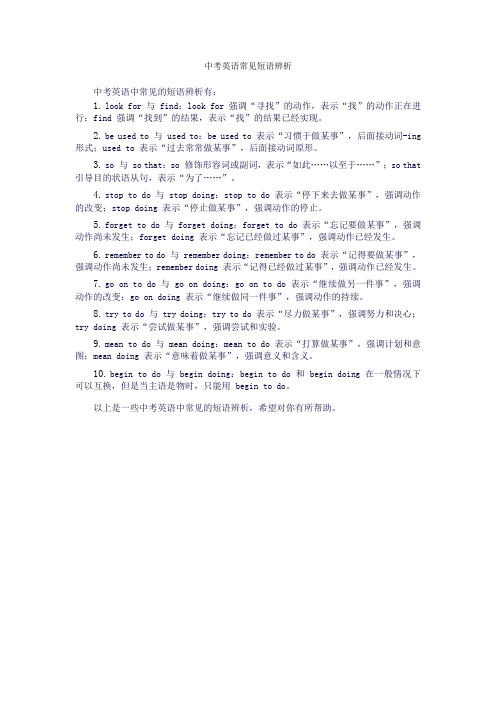
中考英语常见短语辨析中考英语中常见的短语辨析有:1.look for 与 find:look for 强调“寻找”的动作,表示“找”的动作正在进行;find 强调“找到”的结果,表示“找”的结果已经实现。
2.be used to 与 used to:be used to 表示“习惯于做某事”,后面接动词-ing 形式;used to 表示“过去常常做某事”,后面接动词原形。
3.so 与 so that:so 修饰形容词或副词,表示“如此……以至于……”;so that 引导目的状语从句,表示“为了……”。
4.stop to do 与 stop doing:stop to do 表示“停下来去做某事”,强调动作的改变;stop doing 表示“停止做某事”,强调动作的停止。
5.forget to do 与 forget doing:forget to do 表示“忘记要做某事”,强调动作尚未发生;forget doing 表示“忘记已经做过某事”,强调动作已经发生。
6.remember to do 与 remember doing:remember to do 表示“记得要做某事”,强调动作尚未发生;remember doing 表示“记得已经做过某事”,强调动作已经发生。
7.go on to do 与 go on doing:go on to do 表示“继续做另一件事”,强调动作的改变;go on doing 表示“继续做同一件事”,强调动作的持续。
8.try to do 与 try doing:try to do 表示“尽力做某事”,强调努力和决心;try doing 表示“尝试做某事”,强调尝试和实验。
9.mean to do 与 mean doing:mean to do 表示“打算做某事”,强调计划和意图;mean doing 表示“意味着做某事”,强调意义和含义。
10.begin to do 与 begin doing:begin to do 和 begin doing 在一般情况下可以互换,但是当主语是物时,只能用 begin to do。
中考英语知识点:形容词词义及短语辨析
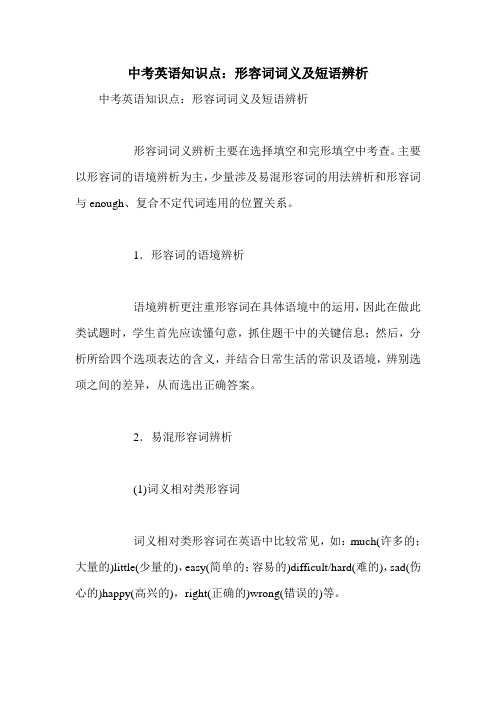
中考英语知识点:形容词词义及短语辨析中考英语知识点:形容词词义及短语辨析
形容词词义辨析主要在选择填空和完形填空中考查。
主要以形容词的语境辨析为主,少量涉及易混形容词的用法辨析和形容词与enough、复合不定代词连用的位置关系。
1.形容词的语境辨析
语境辨析更注重形容词在具体语境中的运用,因此在做此类试题时,学生首先应读懂句意,抓住题干中的关键信息;然后,分析所给四个选项表达的含义,并结合日常生活的常识及语境,辨别选项之间的差异,从而选出正确答案。
2.易混形容词辨析
(1)词义相对类形容词
词义相对类形容词在英语中比较常见,如:much(许多的;大量的)little(少量的),easy(简单的;容易的)difficult/hard(难的),sad(伤心的)happy(高兴的),right(正确的)wrong(错误的)等。
【中考英语、英语语法】【人教版】中考英语动词及动词短语考点剖析
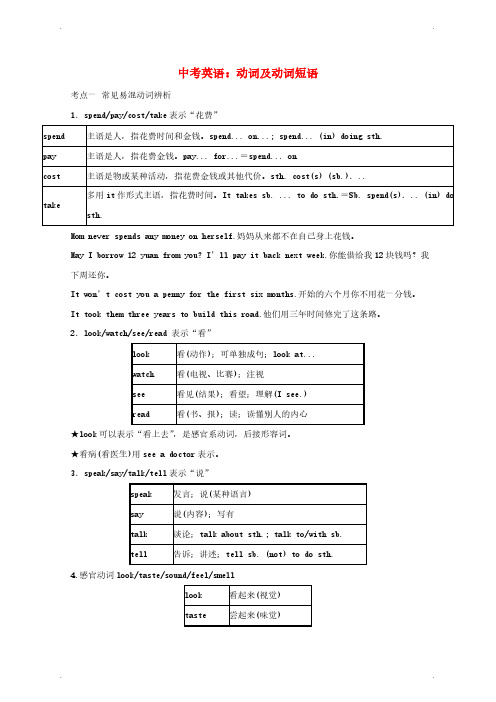
中考英语:动词及动词短语考点一常见易混动词辨析1.spend/pay/cost/take表示“花费”spend主语是人,指花费时间和金钱。
spend... on...; spend... (in) doing sth.pay主语是人,指花费金钱。
pay... for...=spend... oncost主语是物或某种活动,指花费金钱或其他代价。
sth. cost(s) (sb.)...多用it作形式主语,指花费时间。
It takes sb. ... to do sth.=Sb. spend(s)... (in) doin takesth.Mom never spends any money on herself.妈妈从来都不在自己身上花钱。
May I borrow 12 yuan from you? I’ll pay it back next week.你能借给我12块钱吗?我下周还你。
It won’t cost you a penny for the first six months.开始的六个月你不用花一分钱。
It took them three years to build this road.他们用三年时间修完了这条路。
2.look/watch/see/read 表示“看”look看(动作);可单独成句;look at...watch看(电视、比赛);注视see看见(结果);看望;理解(I see.)read看(书、报);读;读懂别人的内心★look可以表示“看上去”,是感官系动词,后接形容词。
★看病(看医生)用see a doctor表示。
3.speak/say/talk/tell表示“说”speak发言;说(某种语言)say说(内容);写有talk谈论;talk about sth.; talk to/with sb.tell告诉;讲述;tell sb. (not) to do sth.4.感官动词look/taste/sound/feel/smelllook看起来(视觉)taste尝起来(味觉)sound听起来(听觉)feel摸起来(触觉)smell闻起来(嗅觉)5.borrow/lend/keep表示“借”borrow借用;borrow sth. from sb.lend借给;lend sth. to sb.keep借用若干时间;keep... for 2 days6.hope/wish/expecthope希望;hope to to sth.; hope+that 从句wish但愿、希望;wish to do sth.; wish sb. to do sth.; wish+that 从句expect期待、期望; expect to do sth.; expect sb. to do sth.7.forget/leaveforget表示“忘记”时,forget通常不能与表示地点的副词或短语连用leave在表示“遗忘”时,通常要与表示地点的状语连用8.hear/listen/soundhear听见;hear+名词(强调听的结果)listen听;listen to+名词(强调听的过程)sound听起来; sound+形容词(强调听的效果)9.wear/put on/dress/be inwear“穿着;戴着”,强调状态,wear后可接穿戴的东西,包括眼镜、首饰等put on“穿上;戴上”,指“穿”的动作,反义词为“take off”“穿衣”,是及物动词,后接人作宾语,意为“给某人穿衣服”;dress onself“打扮;给自己穿dress衣服”be in表示状态,后接衣服,也可接表颜色的词10.reach/get/arrivereach“到达”,是及物动词(比get更正式),其后可直接接地点名词作宾语(不能用介词)get“到达”,不及物动词,之后通常接介词 toarrive“到达”,不及物动词,之后通常接介词 at (一般用于较小的地方)或 in (一般用于较大的地方)1.(2018·山东菏泽单县常青学校模拟三)—I meeting Jack today because I am still angry with him.—Come on, Mary. You are good friends.A.avoid B.expect C.enjoy2.(2018·广东普宁模拟改编)I don’t know the restaurant, but it’s to be quite a good one.A.said B.told C.spoken3.(2018·广西贵港港南二模改编)—How much money did he you yesterday?—500 yuan. I told him I would return it to him in three weeks.A.give B.borrow C.lend4.(2018·甘肃定西中考改编)—I can’t find my English textbook.—Is it possible that you it at home?A.lost B.forgot C.left5.(2018·四川泸州中考改编)It about eight minutes for the light to travel from the sun to the earth.A.costs B.spends C.takes考点二动词短语辨析常考的动词短语辨析有三种:第一种是同一动词的不同搭配;第二种是同一副词或介词与不同动词的搭配;第三种是完全不同的动词短语。
中考常考词词义辨析
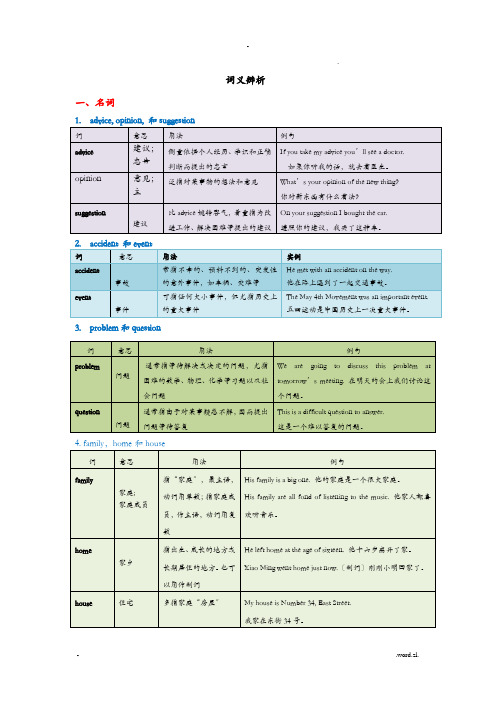
她主动提供了一条有趣的新闻。
information
信息
不可数名词,表示纯粹的那种看不到摸不着的信息
Whatcanwedowiththisinformation?
我们能够利用此信息做什么?
message
消息
可数名词,一般的消息或者是留言等便条信息
自从她最好的朋友离城以后萨拉感到很寂寞。
The car broke down and we were stopped on a lonely road.汽车坏了,我们被困在一条偏僻的路上。
2.living , alive,live和lively
词
意思
用法
实例
living
活着的,活的
作表语、宾补、前置定语
另一个
指两个中的另一个。
He has two sons,oneis in Shanghai,the otheris in Beijing.他有两个儿子,一个在,另一个在。
4..sick与ill
词
意思
用法
实例
sick
生病的
既可以作表语又可以作定语。
She is ill / sick in bed.她卧病在床。
8.a little/a bit
a little
一点
可直接用于不可数名词前作定语
He may need a little help.
他也许需要点帮助。
a bit
一点
它用于不可数名词之前时应要接介词
He knows a bit of French.
他懂一点点法语。
9.few,a few和little a little
中考英语常考的重点词语辨析(含例句)
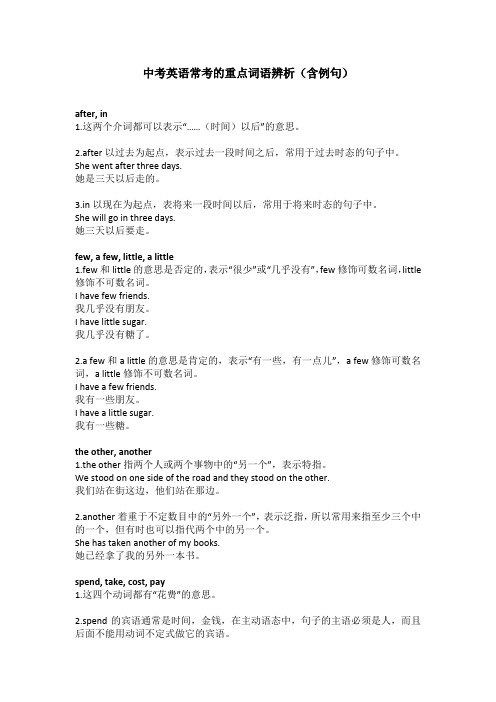
中考英语常考的重点词语辨析(含例句)after, in1.这两个介词都可以表示“……(时间)以后”的意思。
2.after以过去为起点,表示过去一段时间之后,常用于过去时态的句子中。
She went after three days.她是三天以后走的。
3.in以现在为起点,表将来一段时间以后,常用于将来时态的句子中。
She will go in three days.她三天以后要走。
few, a few, little, a little1.few和little的意思是否定的,表示“很少”或“几乎没有”,few修饰可数名词,little 修饰不可数名词。
I have few friends.我几乎没有朋友。
I have little sugar.我几乎没有糖了。
2.a few和a little的意思是肯定的,表示“有一些,有一点儿”,a few修饰可数名词,a little修饰不可数名词。
I have a few friends.我有一些朋友。
I have a little sugar.我有一些糖。
the other, another1.the other指两个人或两个事物中的“另一个”,表示特指。
We stood on one side of the road and they stood on the other.我们站在街这边,他们站在那边。
2.another着重于不定数目中的“另外一个”,表示泛指,所以常用来指至少三个中的一个,但有时也可以指代两个中的另一个。
She has taken another of my books.她已经拿了我的另外一本书。
spend, take, cost, pay1.这四个动词都有“花费”的意思。
2.spend的宾语通常是时间,金钱,在主动语态中,句子的主语必须是人,而且后面不能用动词不定式做它的宾语。
She spent the whole evening in reading.她把整个晚上用来读书。
初中英语短语辨析知识点总结
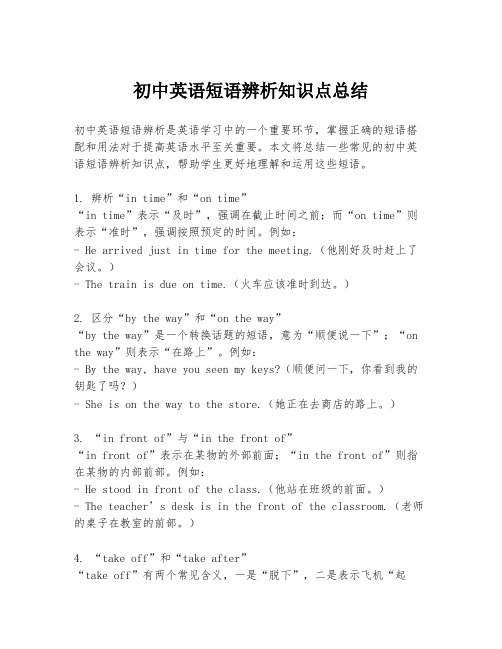
初中英语短语辨析知识点总结初中英语短语辨析是英语学习中的一个重要环节,掌握正确的短语搭配和用法对于提高英语水平至关重要。
本文将总结一些常见的初中英语短语辨析知识点,帮助学生更好地理解和运用这些短语。
1. 辨析“in time”和“on time”“in time”表示“及时”,强调在截止时间之前;而“on time”则表示“准时”,强调按照预定的时间。
例如:- He arrived just in time for the meeting.(他刚好及时赶上了会议。
)- The train is due on time.(火车应该准时到达。
)2. 区分“by the way”和“on the way”“by the way”是一个转换话题的短语,意为“顺便说一下”;“on the way”则表示“在路上”。
例如:- By the way, have you seen my keys?(顺便问一下,你看到我的钥匙了吗?)- She is on the way to the store.(她正在去商店的路上。
)3. “in front of”与“in the front of”“in front of”表示在某物的外部前面;“in the front of”则指在某物的内部前部。
例如:- He stood in front of the class.(他站在班级的前面。
)- The teacher’s desk is in the front of the classroom.(老师的桌子在教室的前部。
)4. “take off”和“take after”“take off”有两个常见含义,一是“脱下”,二是表示飞机“起飞”;“take after”则表示“与……相像”。
例如:- Please take off your shoes before entering.(请在进入前脱掉鞋子。
)- The plane will take off in ten minutes.(飞机将在十分钟后起飞。
中考英语备考形容词(短语)副词词义辨析归纳汇总
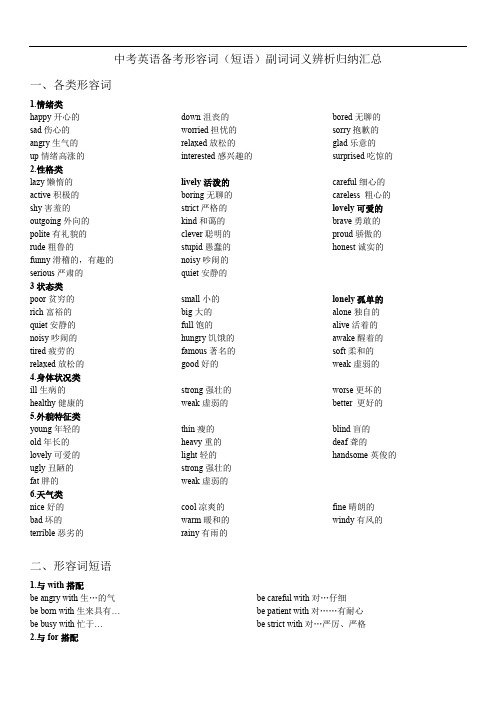
中考英语备考形容词(短语)副词词义辨析归纳汇总一、各类形容词1.情绪类happy开心的sad伤心的angry生气的up情绪高涨的down沮丧的worried担忧的relaxed放松的interested感兴趣的bored无聊的sorry抱歉的glad乐意的surprised吃惊的2.性格类lazy懒惰的active积极的shy害羞的outgoing外向的polite有礼貌的rude粗鲁的funny滑稽的,有趣的serious严肃的lively活泼的boring无聊的strict严格的kind和蔼的clever聪明的stupid愚蠢的noisy吵闹的quiet安静的careful细心的careless 粗心的lovely可爱的brave勇敢的proud骄傲的honest诚实的3状态类poor贫穷的rich富裕的quiet安静的noisy吵闹的tired疲劳的relaxed放松的small小的big大的full饱的hungry饥饿的famous著名的good好的lonely孤单的alone独自的alive活着的awake醒着的soft柔和的weak虚弱的4.身体状况类ill生病的healthy健康的strong强壮的weak虚弱的worse更坏的better 更好的5.外貌特征类young年轻的old年长的lovely可爱的ugly丑陋的fat胖的thin瘦的heavy重的light轻的strong强壮的weak虚弱的blind盲的deaf聋的handsome英俊的6.天气类nice好的bad坏的terrible恶劣的cool凉爽的warm暖和的rainy有雨的fine晴朗的windy有风的二、形容词短语1.与with搭配be angry with生…的气be born with生来具有…be busy with忙于…be careful with对…仔细be patient with对……有耐心be strict with对…严厉、严格2.与for搭配be bad for对……有害be famous/ known for因……而出名be late for迟到be/get ready for为……做准备be sorry for为……感到抱歉、遗憾be thirsty for渴望…3.与to搭配be friendly to对…友好be harmful to对……有害be similar to与…相似4.与of搭配be afraid of害怕…be fond of喜欢…be full of充满…be proud of为……感到自豪be tired of厌烦…5.与about搭配be crazy about对……着迷be excited about因……而激动be sure about对……有把握be worried about为……担心6.其他be good at擅长…be mad at对……感到生气be surprised at对……感到惊讶be hard on对……严苛be interested in对……感兴趣三、各类副词1.-ly结尾的副词actually实际上bravely勇敢地certainly肯定地carelessly粗心地badly 严重地;恶劣地busily忙碌地carefully小心地clearly清晰地closely紧密地easily容易地exactly准确地finally 最终happily快乐地immediately立刻lately最近luckily幸运地nearly几乎possibly可能地quickly迅速地really真正地suddenly突然地confidently自信地especially尤其excitedly兴奋地freely自由地heavily重地kindly亲切地loudly大声地mainly主要地politely礼貌地;客气地properly合适地quietly安静地recently最近safely安全地2.频度副词twice两次daily天天,常常always总是,经常every day每天every week每周every month每月weekly每周,每周一次usually通常sometimes有时ever曾经not … any more/ longer不再again and again一次又一次at times 有时,间或now and then偶尔never从来不often 经常,常常3.时间副词now现在then然后today今天tomorrow明天before以前ago以前late晚,迟soon很快once曾经,以前still仍然yesterday昨天already已经early早点immediately立即,立刻4.地点副词here这儿there那儿left左边right右边north北边south南边east东边upstairs楼上downstairs楼下above上方behind后面everywhere每个地方anywhere任何地方west西边5.程度副词quite相当,完全,十分rather相当,颇,有点儿very非常too太much许多a lot许多a little一点儿,一些a bit少量enough足够so这样,这么hardly几乎不almost几乎6.表“也,又”的副词too 一般用于肯定句,常放在句末,用逗号隔开as well 一般用于肯定句,常放在句末also 常放在be动词、情态动词或助动词之后,行为动词之前either 用于否定句,常放在句末,用逗号隔开四、特殊形式的形容词、副词。
专题04 词法考点之词义辨析及短语辨析-2024年中考英语二轮热点题型归纳与变式演练(江苏专用)
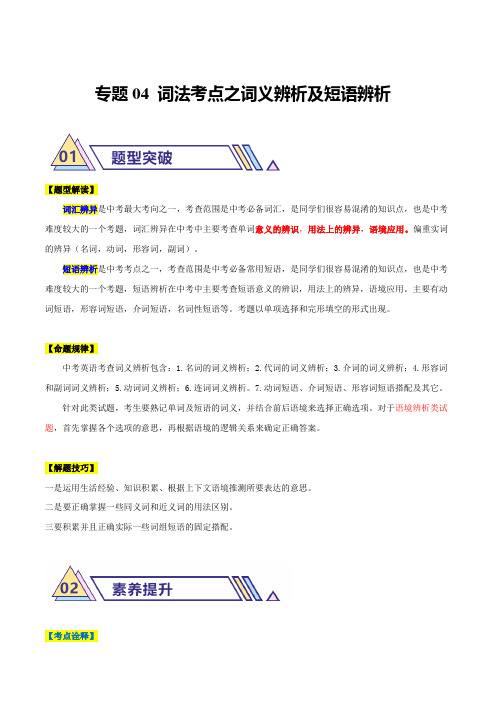
专题04 词法考点之词义辨析及短语辨析【题型解读】词汇辨异是中考最大考向之一,考查范围是中考必备词汇,是同学们很容易混淆的知识点,也是中考难度较大的一个考题,词汇辨异在中考中主要考查单词意义的辨识,用法上的辨异,语境应用。
偏重实词的辨异(名词,动词,形容词,副词)。
短语辨析是中考考点之一,考查范围是中考必备常用短语,是同学们很容易混淆的知识点,也是中考难度较大的一个考题,短语辨析在中考中主要考查短语意义的辨识,用法上的辨异,语境应用。
主要有动词短语,形容词短语,介词短语,名词性短语等。
考题以单项选择和完形填空的形式出现。
【命题规律】中考英语考查词义辨析包含:1.名词的词义辨析;2.代词的词义辨析;3.介词的词义辨析;4.形容词和副词词义辨析;5.动词词义辨析;6.连词词义辨析。
7.动词短语、介词短语、形容词短语搭配及其它。
针对此类试题,考生要熟记单词及短语的词义,并结合前后语境来选择正确选项。
对于语境辨析类试题,首先掌握各个选项的意思,再根据语境的逻辑关系来确定正确答案。
【解题技巧】一是运用生活经验、知识积累、根据上下文语境推测所要表达的意思。
二是要正确掌握一些同义词和近义词的用法区别。
三要积累并且正确实际一些词组短语的固定搭配。
【考点诠释】【典题举隅】1.The newly-built museum is easily _________ by car.A.suitable B.observable C.horrible D.accessible【答案】D【详解】考查形容词词义辨析。
句意:新建的博物馆很容易驱车到达。
A.suitable合适的;B.observable观察得到的;C.horrible讨厌的;D.accessible可到达的。
根据句意,此处表示开车容易到达,故选D。
2.He is such a brave person that I have always had the greatest _________ for him.A.generation B.operation C.admiration D.observation【答案】C【详解】考查名词词义辨析。
初三英语专题讲解词汇辨析
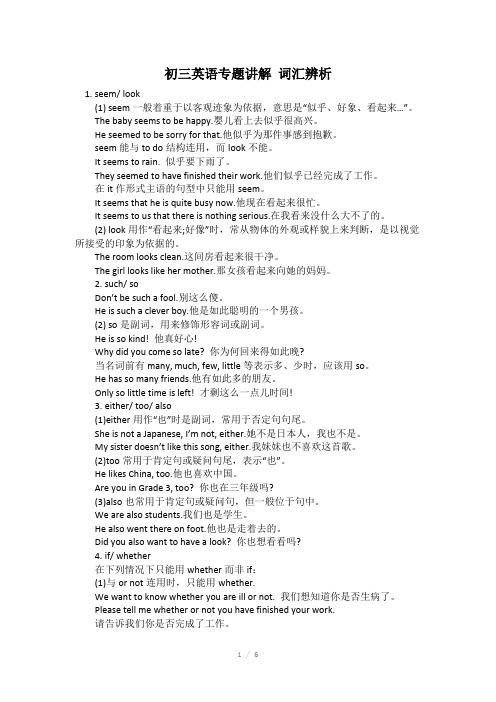
初三英语专题讲解词汇辨析1. seem/ look(1) seem一般着重于以客观迹象为依据,意思是“似乎、好象、看起来…”。
The baby seems to be happy.婴儿看上去似乎很高兴。
He seemed to be sorry for that.他似乎为那件事感到抱歉。
seem能与to do结构连用,而look不能。
It seems to rain. 似乎要下雨了。
They seemed to have finished their work.他们似乎已经完成了工作。
在it作形式主语的句型中只能用seem。
It seems that he is quite busy now.他现在看起来很忙。
It seems to us that there is nothing serious.在我看来没什么大不了的。
(2) look用作“看起来;好像”时,常从物体的外观或样貌上来判断,是以视觉所接受的印象为依据的。
The room looks clean.这间房看起来很干净。
The girl looks like her mother.那女孩看起来向她的妈妈。
2. such/ soDon’t be such a fool.别这么傻。
He is such a clever boy.他是如此聪明的一个男孩。
(2) so是副词,用来修饰形容词或副词。
He is so kind! 他真好心!Why did you come so late? 你为何回来得如此晚?当名词前有many, much, few, little等表示多、少时,应该用so。
He has so many friends.他有如此多的朋友。
Only so little time is left! 才剩这么一点儿时间!3. either/ too/ also(1)either用作“也”时是副词,常用于否定句句尾。
She i s not a Japanese, I’m not, either.她不是日本人,我也不是。
中考英语短语词义辨析专项讲解
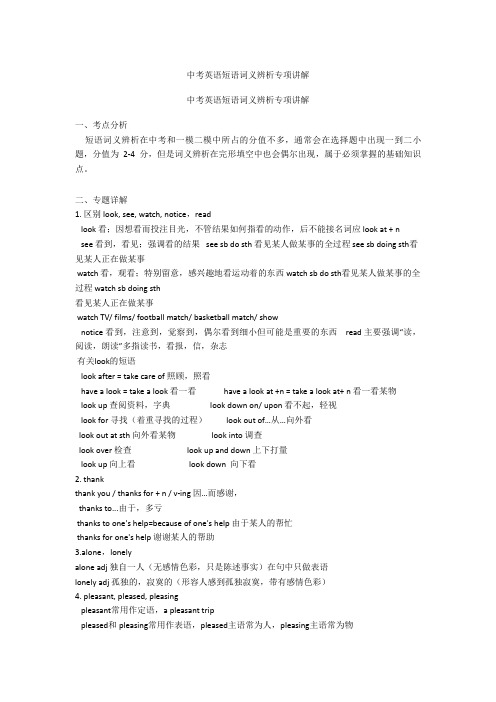
中考英语短语词义辨析专项讲解中考英语短语词义辨析专项讲解一、考点分析短语词义辨析在中考和一模二模中所占的分值不多,通常会在选择题中出现一到二小题,分值为2-4分,但是词义辨析在完形填空中也会偶尔出现,属于必须掌握的基础知识点。
二、专题详解1. 区别 look, see, watch, notice,readlook 看;因想看而投注目光,不管结果如何指看的动作,后不能接名词应 look at + nsee 看到,看见;强调看的结果 see sb do sth 看见某人做某事的全过程 see sb doing sth看见某人正在做某事watch 看,观看;特别留意,感兴趣地看运动着的东西 watch sb do sth看见某人做某事的全过程 watch sb doing sth看见某人正在做某事watch TV/ films/ football match/ basketball match/ shownotice 看到,注意到,觉察到,偶尔看到细小但可能是重要的东西 read 主要强调“读,阅读,朗读”多指读书,看报,信,杂志有关look的短语look after = take care of 照顾,照看have a look = take a look 看一看 have a look at +n = take a look at+ n 看一看某物look up 查阅资料,字典 look down on/ upon 看不起,轻视look for 寻找(着重寻找的过程) look out of…从…向外看look out at sth 向外看某物 look into 调查look over 检查 look up and down 上下打量look up 向上看 look down 向下看2. thankthank you / thanks for + n / v-ing 因…而感谢,thanks to...由于,多亏thanks to one's help=because of one's help 由于某人的帮忙thanks for one's help 谢谢某人的帮助3.alone,lonelyalone adj 独自一人(无感情色彩,只是陈述事实)在句中只做表语lonely adj 孤独的,寂寞的(形容人感到孤独寂寞,带有感情色彩)4. pleasant, pleased, pleasingpleasant常用作定语,a pleasant trippleased和 pleasing常用作表语,pleased主语常为人,pleasing主语常为物pleasure n 愉快,快乐,高兴be pleased with sb /sth 对某人、事感到欣喜的,满意的be pleased to do sth 乐意做某事it’s one’s pleasure to do sth 做某事是某人的荣幸5.stop,forget,rememberstop to do sth 意为“停下(正在做的事情)去做其他的事”stop doing sth 意为“停止(正在)做的事情”forget to do sth 忘记要去做某事forget doing sth 忘记已经做过的事remember to do sth 记得要去做某事remember doing sth 记得已经做过的事go on doing sth = keep on doing sth = carry on doing sth 继续做某事(同一件事)go on to do sth 接着干别的事6.makemake A out of B 用B制造Amake sth for sb 为某人制造某物do sth for sb为某人做某事be made of sth 由…制造(看得出原材料)be made from sth由…制造(看不出原材料)be made by sb 由某人制造7.say,speak,talk,tellsay 强调说的具体内容 eg .can you say the story in English ?speak 指说话的能力,后经常跟语言的种类 eg. Can you speak English ?tell 告诉,讲诉tell sb about sth 告诉某人有关有事 tell sb to do sth 叫某人做某事 tell sb not to do sth 叫某人不要做某事talk 交谈,谈话talk with sb 与某人交谈 talk to sb 给某人说(侧重于一方说,别一方在听)talk about sth 谈论某事8.pay,spend,cost,take.sb pay + 金钱 + for sth 某人为…付…钱Sb spend + 时间/ 金钱 + on sth Sb spend + 时间 / 金钱 + (in) doing sthSth cost sb 金钱主语是物It takes sb + 时间 + to do sth9.instead,instead ofinstead adv 代替单独使用,放于句首或句末instead of + n/ pron/v-ing 介词短语意为“代替…而不是…”放于句中10..would like to do sth = want to do sth=feel like doing 想要做某事Would like sb to do sth = want sb to do sth 想要某人做某事11.hope,wishhope to do sth 希望做某事 hope + 从句希望…wish to do sth 希望做某事 wish sb to do sth 希望某人做某事12.getget on/off(the bus) 上/下车get up 起床get ready for 为...作准备get oneself dressed 自己穿衣服get well (better) 身体好get in 进入,收集get sb.sth.=get sth.for sb. 为某人买某物get on well with sb/sth. 与某人相处很好,...进展顺利13.sendsend sb. away 开除、解雇某人send for sb. 派人去请某人send up 发射send sth to sb = send sb sth 把某物寄给某人14.hearhear from sb= receive a letter from sb 收到...的来信hear of 听说15.到达某地的几种表达法get to +名词 get +副词(不用to)reach+名词/副词 reach后不接宾语不能单独使用e.g. Do you know when he will reach? (错误)arrive in/at +大/小地点(后接副词,不用at/in)e.g. get to Shanghai、reach Shanghai 、arrive in Shanghai到达上海e.g. reach home、get home、arrive home 到家16. endby the end of +过去时间(用于过去完成时)到...末为止by the end of +将来时间(用于一般将来时)到...末为止at the end of+地点在...尽头in the end= at last 最后,终于at the beginning of 在…的开端,开始in the beginning 开始= at first17.. much too+形容词/副词原级实在太...too much+不可数名词相当多的... too many+可数名词的复数18. sellsell out 售完卖完on sell 打折in sell 当季19.finish doing sth. 做完某事complete to do sth 完成某事be always doing 老是干某事20.look for 寻找(着重指过程)find 寻找(着重指结果)find out (经过查询,研究)找到结果,发现秘密search sb 搜身 search sp for sb/sth 为了搜查某人、物而搜寻某地21.穿过.across prep 横穿(从物体的表面穿过) go across = crossthrough prep 横穿(从物体的空间穿过) go through window/ door / forest22.在......之间between 用于两个人,两件事之间,指“两者之间”among 用于三个或三个以上的人或物之间,或笼统的一群人或一些物之间,表示在…之间23.other,anotherother adj 其他的,别的,另外,常作定语another pron 指不定数目中的另一个人或物意为“又一,再一” another + 数词+ 可数名词/ 不可数名词others pron 另外的,其他的或别的人或事物,主要表示其中一部分而不是全部 the other 指两者或双方中的另一个人或物常用于 one … the other the others 是 the other 的复数,属于特指,后不能跟名词 the others = the other + 可数名词的复数指一个范围内的剩余全部。
九年级英语动词短语词义辨及解析
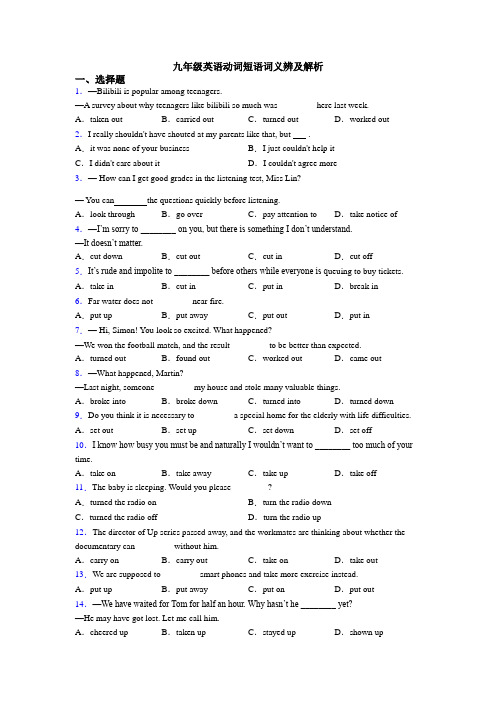
九年级英语动词短语词义辨及解析一、选择题1.—Bilibili is popular among teenagers.—A survey about why teenagers like bilibili so much was ________ here last week.A.taken out B.carried out C.turned out D.worked out2.I really shouldn't have shouted at my parents like that, but .A.it was none of your business B.I just couldn't help itC.I didn't care about it D.I couldn't agree more3.— How can I get good grades in the listening test, Miss Lin?— You can the questions quickly before listening.A.look through B.go over C.pay attention to D.take notice of 4.—I’m sorry to ________ on you, but there is something I don’t understand.—It doesn’t matter.A.cut down B.cut out C.cut in D.cut off5.It’s rude and impolite to ________ before others while everyone is q ueuing to buy tickets. A.take in B.cut in C.put in D.break in6.Far water does not ________ near fire.A.put up B.put away C.put out D.put in7.— Hi, Simon! You look so excited. What happened?—We won the football match, and the result ________ to be better than expected.A.turned out B.found out C.worked out D.came out 8.—What happened, Martin?—Last night, someone ________ my house and stole many valuable things.A.broke into B.broke down C.turned into D.turned down 9.Do you think it is necessary to ________ a special home for the elderly with life difficulties. A.set out B.set up C.set down D.set off10.I know how busy you must be and naturally I wouldn’t want to ________ too much of your time.A.take on B.take away C.take up D.take off 11.The baby is sleeping. Would you please ________?A.turned the radio on B.turn the radio downC.turned the radio off D.turn the radio up12.The director of Up series passed away, and the workmates are thinking about whether the documentary can ________ without him.A.carry on B.carry out C.take on D.take out 13.We are supposed to ________ smart phones and take more exercise instead.A.put up B.put away C.put on D.put out 14.—We have waited for Tom for half an hour. Why hasn’t he ________ yet?—He may have got lost. Let me call him.A.cheered up B.taken up C.stayed up D.shown up15.He used to ________ with his friends and watch movies in the cinema.A.stay up B.wake up C.come up D.make up 16.—I ________ reading English every morning.—Yes, English is very important and it ________ the first language in England and some other countries.A.used to; is used by B.used to; is used asC.am used to; is used as D.am used to; is used by17.—Aunt Lexie, could you please teach me how to _________ "red envelope" on WeChat?—Certainly. It goes like this.A.give away B.give up C.give back D.give out 18.Please _____ the water when you brush your teeth.A.take down B.turn up C.take away D.turn off19.He always ________ his friends about everything. In fact, he has no thoughts of his own. A.talks with B.plays withC.deals with D.agrees with20.Andrew once tried to ________ a brighter light in his bedroom, but he failed in the end. A.put on B.put in C.put out D.put up21.The rain has stopped. Why not ________ the raincoat?A.take away B.pass away C.put away D.put off 22.Would you please ____________ the light? I can't sleep well with it on.A.turn on B.turn off C.turn to D.turn around 23.You’d better________all the questions before having the test.A.look after B.look at C.look out D.look through 24.—Excuse me, does Mr. Smith’s son live here?— He ________ be here. But now he ________ in the city.A.used to; is used to live B.was used to; is used to livingC.used to; is used to living D.is used to; used to live25.A new high-speed railway station ________ Taixing ________ Shanghai will be built soon. A.connecting; to B.connected; to C.connects; with D.connected; and 26.— Excuse me, which is the way to Kaiming Middle School?—________ this street, and you’ll find it on your right.A.Write down B.Go down C.Lie down D.Sit down 27.—What can I do for you, Linda?—I hope you can help me ________ the useless words in my article.A.make up B.cut out C.turn off D.put up28.As a volunteer, he often goes to the hospital to ________ the sick.A.cheer for B.help for C.put up D.cheer up29.-Oh,my God! I have ________ five pounds!-No worries. It’s normal for a growing teenage girl.A.put up B.put down C.put on D.put off30.There’s no doubt the Belt and Road will successfully ________ cooperation and development between China and other countries along the line.A.push for B.care for C.look for D.hope for31.—All right, I’ll take it. But I tell you, it is the last time I will _________ this kind of work —Come on, Buddy! Don’t be so serious.A.take off B.take out C.take on D.take up32.What a pity! The weather ________ to be rainy. We had to cancel the sports meeting. A.ran out B.broke out C.found out D.turned out33.V olunteers ________ leaflets to encourage more people to separate rubbish correctly.A.put out B.find out C.hand out D.turn out 34.—Excuse me, sir, but smoking is not allowed in hospital.—Sorry, I didn’t see the sign. I’ll _______ my cigarette.A.put in B.put up C.put out D.put on35.The workers ________ a sign to warn people of the danger here.A.put out B.put in C.put up D.put on36.My father is crazy about DIY. He’s trying to ________ a cupboard in the kitchen.A.put up B.put in C.put on D.put away 37.This bus doesn’t go to the train station. I am afraid you will have to ________ at the next stop and take BRT Line 1.A.get out B.get off C.get through D.get down 38.Sometimes results will just ________ opposite of our wish. We need to accept them anyway. A.carry out B.break out C.run out D.turn out39.A forest fire ________ in September in Australia last year and many rare animals lost their lives in it.A.turned out B.broke out C.put out D.worked out 40.We should ________ the job bravely instead of complaining too much. It’s our duty! A.take away B.take up C.take on D.take off【参考答案】一、选择题1.B解析:B【详解】句意:——哔哩哔哩在青少年中很受欢迎。
- 1、下载文档前请自行甄别文档内容的完整性,平台不提供额外的编辑、内容补充、找答案等附加服务。
- 2、"仅部分预览"的文档,不可在线预览部分如存在完整性等问题,可反馈申请退款(可完整预览的文档不适用该条件!)。
- 3、如文档侵犯您的权益,请联系客服反馈,我们会尽快为您处理(人工客服工作时间:9:00-18:30)。
中考英语短语词义辨析专项讲解一、考点分析短语词义辨析在中考和一模二模中所占的分值不多,通常会在选择题中出现一到二小题,分值为2-4分,但是词义辨析在完形填空中也会偶尔出现,属于必须掌握的基础知识点。
二、专题详解1. 区别 look, see, watch, notice,readlook 看;因想看而投注目光,不管结果如何指看的动作,后不能接名词应 look at + nsee 看到,看见;强调看的结果 see sb do sth 看见某人做某事的全过程 see sb doing sth看见某人正在做某事watch 看,观看;特别留意,感兴趣地看运动着的东西 watch sb do sth看见某人做某事的全过程 watch sb doing sth看见某人正在做某事watch TV/ films/ football match/ basketball match/ shownotice 看到,注意到,觉察到,偶尔看到细小但可能是重要的东西 read 主要强调“读,阅读,朗读”多指读书,看报,信,杂志有关look的短语look after = take care of 照顾,照看have a look = take a look 看一看have a look at +n = take a look at+ n 看一看某物look up 查阅资料,字典 look down on/ upon 看不起,轻视look for 寻找(着重寻找的过程)look out of…从…向外看look out at sth 向外看某物 look into 调查look over 检查 look up and down 上下打量look up 向上看look down 向下看2. thankthank you / thanks for + n / v-ing 因…而感谢,thanks to...由于,多亏thanks to one's help=because of one's help 由于某人的帮忙thanks for one's help 谢谢某人的帮助3.alone,lonelyalone adj 独自一人(无感情色彩,只是陈述事实)在句中只做表语lonely adj 孤独的,寂寞的(形容人感到孤独寂寞,带有感情色彩)4. pleasant, pleased, pleasingpleasant常用作定语,a pleasant trippleased和 pleasing常用作表语,pleased主语常为人,pleasing主语常为物pleasure n 愉快,快乐,高兴be pleased with sb /sth 对某人、事感到欣喜的,满意的be pleased to do sth 乐意做某事it’s one’s pleasure to do sth 做某事是某人的荣幸5.stop,forget,rememberstop to do sth 意为“停下(正在做的事情)去做其他的事”stop doing sth 意为“停止(正在)做的事情”forget to do sth 忘记要去做某事forget doing sth 忘记已经做过的事remember to do sth 记得要去做某事remember doing sth 记得已经做过的事go on doing sth = keep on doing sth = carry on doing sth 继续做某事(同一件事)go on to do sth 接着干别的事6.makemake A out of B 用B制造Amake sth for sb 为某人制造某物do sth for sb为某人做某事be made of sth 由…制造(看得出原材料)be made from sth由…制造(看不出原材料)be made by sb 由某人制造7.say,speak,talk,tellsay 强调说的具体内容 eg .can you say the story in English ?speak 指说话的能力,后经常跟语言的种类 eg. Can you speak English ?tell 告诉,讲诉tell sb about sth 告诉某人有关有事 tell sb to do sth 叫某人做某事 tell sb not to do sth 叫某人不要做某事talk 交谈,谈话talk with sb 与某人交谈 talk to sb 给某人说(侧重于一方说,别一方在听)talk about sth 谈论某事8.pay,spend,cost,take.sb pay + 金钱 + for sth 某人为…付…钱Sb spend + 时间/ 金钱 + on sth Sb spend + 时间 / 金钱 + (in) doing sthSth cost sb 金钱主语是物It takes sb + 时间 + to do sth9.instead,instead ofinstead adv 代替单独使用,放于句首或句末instead of + n/ pron/v-ing 介词短语意为“代替…而不是…”放于句中10..would like to do sth = want to do sth=feel like doing 想要做某事Would like sb to do sth = want sb to do sth 想要某人做某事11.hope,wishhope to do sth 希望做某事 hope + 从句希望…wish to do sth 希望做某事 wish sb to do sth 希望某人做某事12.getget on/off(the bus) 上/下车get up 起床get ready for 为...作准备get oneself dressed 自己穿衣服get well (better) 身体好get in 进入,收集get sb.sth.=get sth.for sb. 为某人买某物get on well with sb/sth. 与某人相处很好,...进展顺利13.sendsend sb. away 开除、解雇某人send for sb. 派人去请某人send up 发射send sth to sb = send sb sth 把某物寄给某人14.hearhear from sb= receive a letter from sb 收到...的来信hear of 听说15.到达某地的几种表达法get to +名词 get +副词(不用to)reach+名词/副词 reach后不接宾语不能单独使用e.g. Do you know when he will reach? (错误)arrive in/at +大/小地点(后接副词,不用at/in)e.g. get to Shanghai、reach Shanghai 、arrive in Shanghai到达上海e.g. reach home、get home、arrive home 到家16. endby the end of +过去时间(用于过去完成时)到...末为止by the end of +将来时间(用于一般将来时)到...末为止at the end of+地点在...尽头in the end= at last 最后,终于at the beginning of 在…的开端,开始in the beginning 开始= at first17.. much too+形容词/副词原级实在太...too much+不可数名词相当多的... too many+可数名词的复数18. sellsell out 售完卖完on sell 打折in sell 当季19.finish doing sth. 做完某事complete to do sth 完成某事be always doing 老是干某事20.look for 寻找(着重指过程)find 寻找(着重指结果)find out (经过查询,研究)找到结果,发现秘密search sb 搜身 search sp for sb/sth 为了搜查某人、物而搜寻某地21.穿过.across prep 横穿(从物体的表面穿过) go across = crossthrough prep 横穿(从物体的空间穿过) go through window/ door / forest22.在......之间between 用于两个人,两件事之间,指“两者之间”among 用于三个或三个以上的人或物之间,或笼统的一群人或一些物之间,表示在…之间23.other,anotherother adj 其他的,别的,另外,常作定语another pron 指不定数目中的另一个人或物意为“又一,再一” another + 数词+ 可数名词/ 不可数名词others pron 另外的,其他的或别的人或事物,主要表示其中一部分而不是全部 the other 指两者或双方中的另一个人或物常用于 one … the other the others 是 the other 的复数,属于特指,后不能跟名词 the others = the other + 可数名词的复数指一个范围内的剩余全部。
24..sometime 某时 some time 一段时间 sometimes 有时 some times 倍次25.mindchange one’s mind 改变主意make up one’s mind 作出决定keep… in mind 记住Never mind 不要紧mind one’s doing sth 介意某人做某事mind doing sth 介意做某事26.和,也.too 也,用于肯定句句末 also 也,用于肯定句句中 either 也,用于否定句句末as well as 也连词,连接两个并列主语时用就近原则27.famousbe well- known / famous for 因…而出名Hainan island is famous for beautiful scenes.be well- known / famous as 作为…而出名Einstein was famous as a scientist.be famous to....熟悉的人Yao Ming is famous to all our Chinese.28.becausebecause + 从句因为…because of + n/ pron/ v-ing 因为…29.workwork on 从事于,致力于work out 计算出30 .as.......asas + adj/ adv as possible 尽可能…,尽量…as much as possible 尽可能多 as early as possible 尽可能早 as soon as possible 一…就…31. run away (from) (从…)逃走,突然离开 run out 用完,用尽32.发生.happen 指偶然,意外地发生某事take place 指按照计划,安排发生某事take place of sb/sth 取代,代替(某人,某事)33.timeall the time 一直one time 曾经 at the same time 同时at the time 在那时 on time 按时 in time 及时at times = from timeto time = sometimes 有时34.preferprefer + n / v-ing to + n/ v-ing 比起…更喜欢…prefer to do sth 更喜欢做某事would rather do sth than do sth比起…更喜欢…Prefer to do rather than do sth 宁愿做.......而不做......edused to do sth 过去常常做某事be used to doing sth 习惯于做某事be used to do sth 被用来做某事be used for doing sth 被用来做某事be used as 被当作….而使用36. a number of, the number ofa number of许多,谓语用复数。
